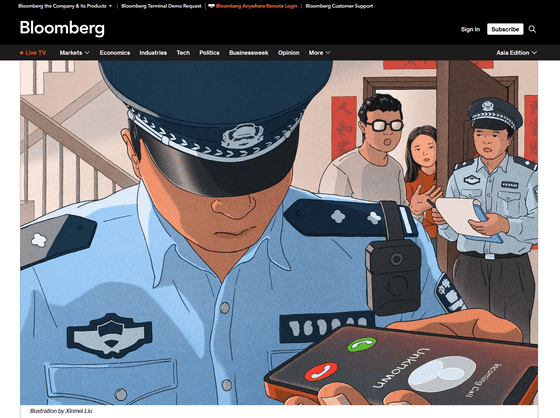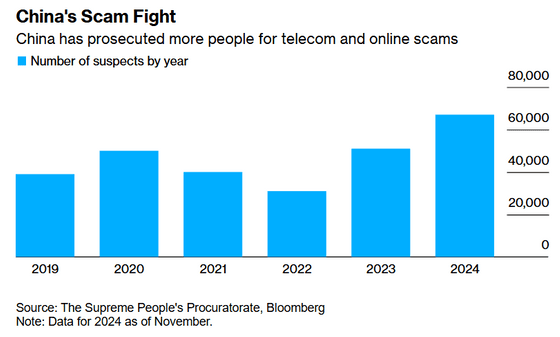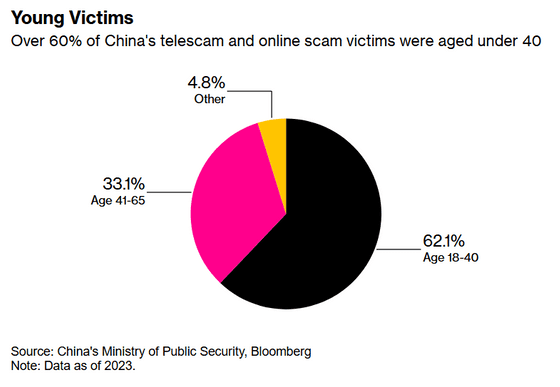In China, excessive 'crackdown on online fraud' has led to home searches and wiretapping, raising privacy concerns

As China's economy begins to slow, online scams promising quick money are rampant, and authorities' efforts to monitor and curb them are giving rise to new problems of violating citizens' privacy, reports foreign media outlet Bloomberg.
China Online Scams: Xi Jinping Cracks Down on Fraud With Huge Surveillance State - Bloomberg

According to one man who was interviewed by Bloomberg, one day he received a phone call from overseas, and immediately afterwards the police called to warn him that he was being scammed. Within 10 minutes, several police officers arrived at his house, made him sign a document stating that he had done nothing to make himself the victim of financial fraud, and then left.
The man was surprised at how quickly the action was handled, recalling, 'I couldn't help but wonder if it took that many people to deal with a fraud of that magnitude.'
Such cases are common in China, where authorities have intercepted around 7 billion phone calls and a similar number of text messages between 2021 and May 2024, and conducted more than 18 million face-to-face interviews in an effort to discourage people from contacting scammers.
In contrast to the United States, where the government has been criticized for not doing enough to protect its citizens from fraud, China's heavy-handed and disregardful approach to personal freedoms has raised privacy concerns. 'Many people see this as a sign that the government cares about them, but some people are focused on the fact that someone is watching them,' said
The following graph, created by Bloomberg based on data from the Supreme People's Procuratorate, shows the trend in the number of people prosecuted for telecommunications and online fraud in China.

Bloomberg points out that the fact that authorities are monitoring all of Americans' activities, including phone calls, online communications, and shopping, to keep an eye out for scams is a sign of their growing concern.
In China, the real estate market, once a surefire way to make money, is in a slump, low interest rates have dented investment and many young people are out of work, leading to more people being duped by scams promising quick profits and big bucks.
Below is a graph created by Bloomberg from data from the Chinese Ministry of Public Security showing the age breakdown of online fraud victims. According to the Ministry of Public Security, the average age of people who fell victim to internet or telecommunications-related fraud in China in 2023 was 37 years old, and about 62% of victims were between 18 and 40 years old.

China has never disclosed how much its citizens have lost to these scams, but claims that a campaign to crack down on online fraud launched by President Xi Jinping in 2021 has prevented more than 1.1 trillion yuan (about 22 trillion yen) in losses so far.
Romantic baiting is a particular concern among online scams. This romance scam originating from China, also known as 'pig killing,' has formed a large-scale international criminal network centered in Asia, and in January 2025, it was widely reported that a Chinese actor who had been held captive in a major scam base near the border between Myanmar and Thailand was rescued . It was discovered that the Cambodian fraud platform 'Huione Guarantee' had processed more than $49 billion (about 7 trillion yen) in virtual currency collected through pig killing scams and other schemes, and it was reported that one in five American adults has fallen victim to online fraud. Online scams, centered on romantic baiting, have become a global problem.
One man who had his bank account frozen for a month by police after receiving a scam call while bedridden with COVID-19, and had to ask permission to transfer money to his Alipay mobile wallet to cover his immediate living expenses, told Bloomberg, 'Of course, the police are doing this for the people, but I think there could be a better solution.'
in Note, Posted by log1l_ks